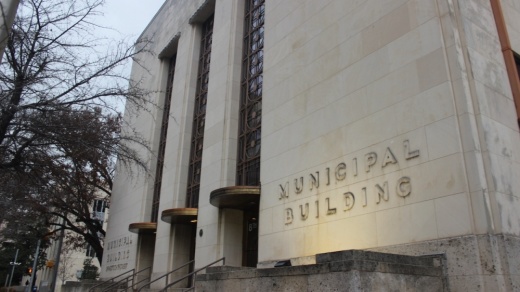Austin has been eyeing the historic municipal building at 124 W. Eighth St. as a possible new home for the Downtown Austin Community Court, or DACC, for months. The DACC handles cases for misdemeanors committed downtown and can provide alternative penalties and rehabilitation or other support services for defendants—many of whom are experiencing homelessness. Since last spring, the DACC has also taken on additional cases involving homelessness citywide for citations under Austin's reinstated public camping ban.
The DACC was located for years on the eastern edge of downtown before its move to One Texas Center off South First Street last summer. Since then, the city has been preparing for the court's move back downtown, although the proposal has attracted opposition along the way.
Community members speaking at public meetings in recent months have cited worries over public safety, the city's site selection and public engagement, renovation costs and other effects on the surrounding neighborhood as reasons behind their opposition.
Bill Brice, vice president for investor relations with the Downtown Austin Alliance, said the organization has also come out firmly against the move given concerns about the city's process so far. While stating that the Downtown Alliance has supported the community court's work since its establishment, Brice said his group believes the plans are not in the best interests of the downtown community or those served by the DACC.
“Hit pause on selecting a location until we know what this court ought to be doing, how it ought to be operating in the future," Brice said March 23.
If selected as a home to the court, the aging Eighth Street municipal facility would need a $27 million renovation before the court or any other city office could move in. Staff estimate a total of $5.33 million would be needed to provide for the DACC alone.
City review
City staff have said placing the DACC on Eighth would have "no impact" on surrounding businesses and cultural centers, and that the DACC's operations would closely mirror its setup at One Texas Center. They also said the DACC's security detail will be in place following its reopening downtown with an option to boost a police presence there as well.
Regardless of the exact landing spot, Court Administrator Pete Valdez said the court's final home should be somewhere downtown.
“We have always been downtown. It is where people know that we are located. And based on the last point-in-time count that was done by [the Ending Community Homelessness Coalition], the concentration of individuals experiencing homelessness is still downtown. So we should be located where that concentration is," Valdez said.
District 9 Council Member Kathie Tovo, who represents the area, including both the temporary and proposed DACC locations, also said she wants to see the court move to a "wonderful public building," regardless of whether it is the historic municipal center. District 6 Council Member Mackenzie Kelly also called attention to what she sees as "misconceptions" in the community about the DACC as a reason to continue conversations about its location.
"There’s a lot of people who I’ve spoken with who are scared of what their neighborhood might become or what it might be like, but as I’ve said before on the dais, I’ve visited the Downtown Austin Community Court, and these perceptions are maybe not true," Kelly said. "It plays a large role in assisting people experiencing homelessness to get out of that situation or access resources, and it is definitely needed in our community."
Next steps
Following a series of recent postponements, action items that would kick-start the relocation process appeared on council's March 24 agenda but were removed in favor of holding a deeper discussion during a work session in the near future. The withdrawal presses pause on a relocation pending that additional analysis of the court.
Council's March 24 vote also came after officials broadened their talks beyond the DACC. Topics such as the One Texas Center's future, its possible role in affordable housing south of Lady Bird Lake and the city's overall management of its leased and owned facilities will all likely resurface during the upcoming work session.





